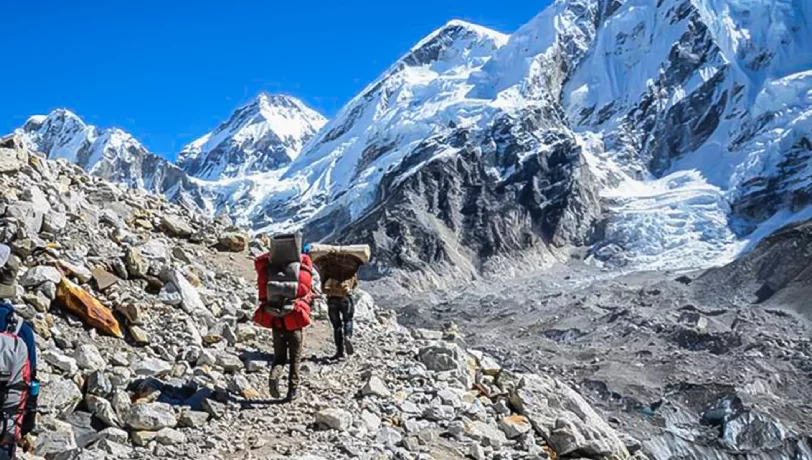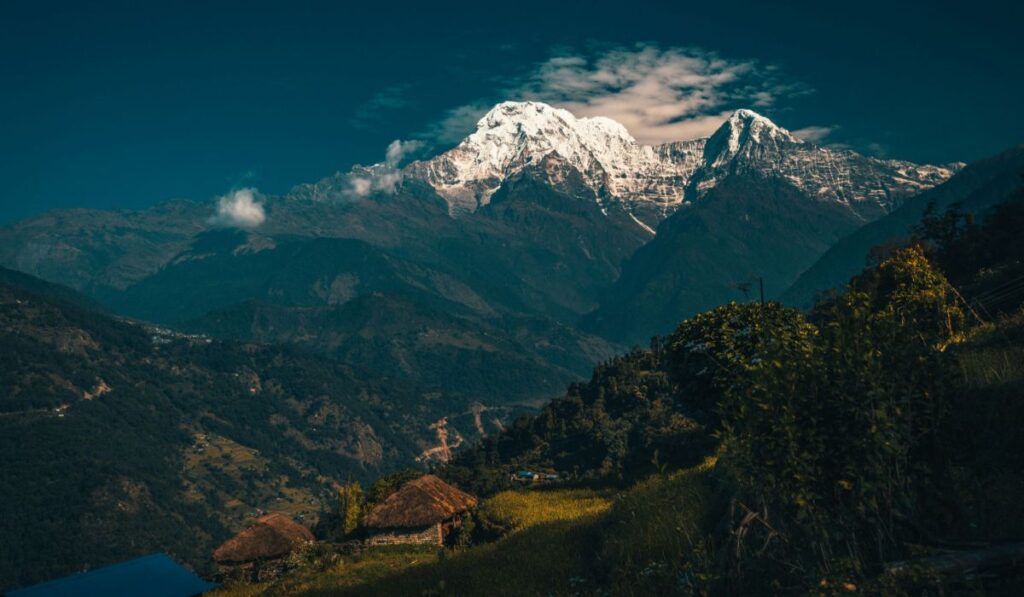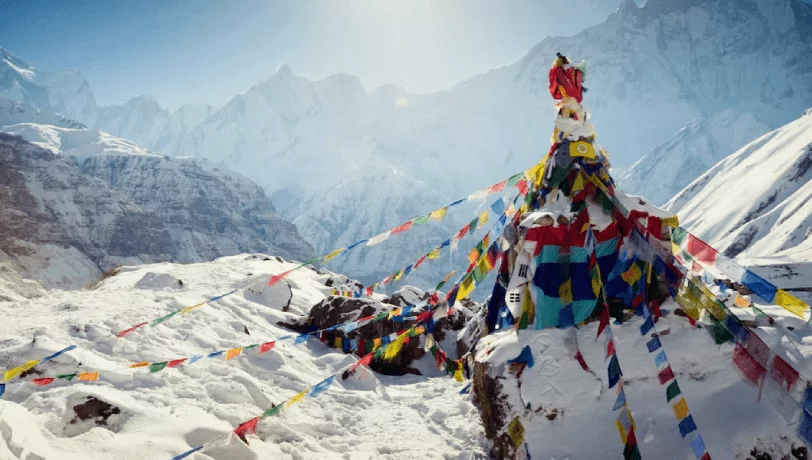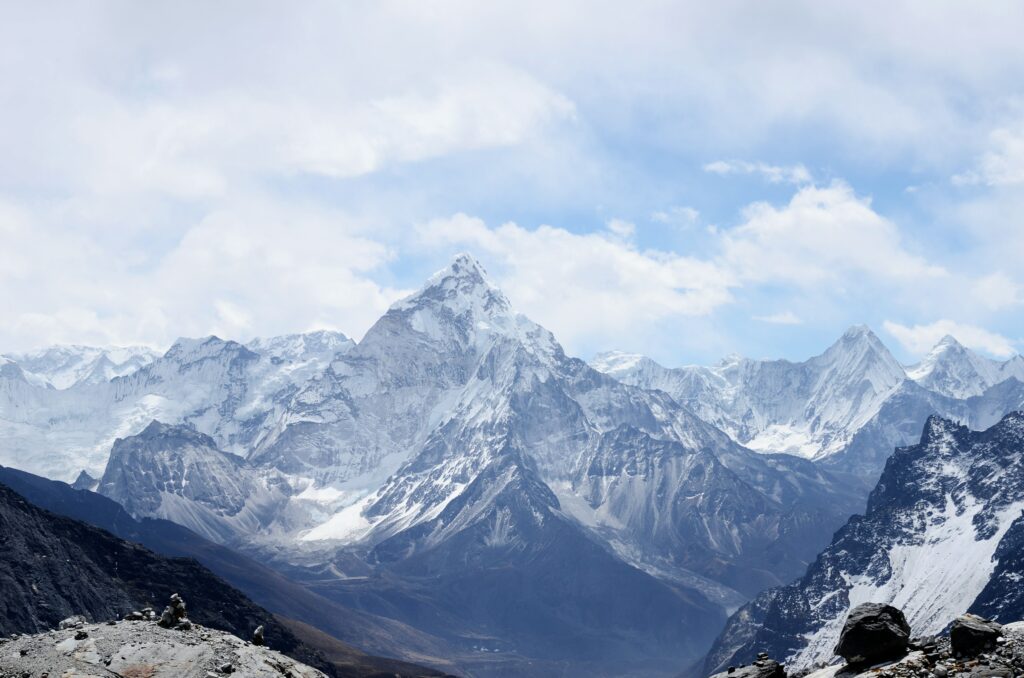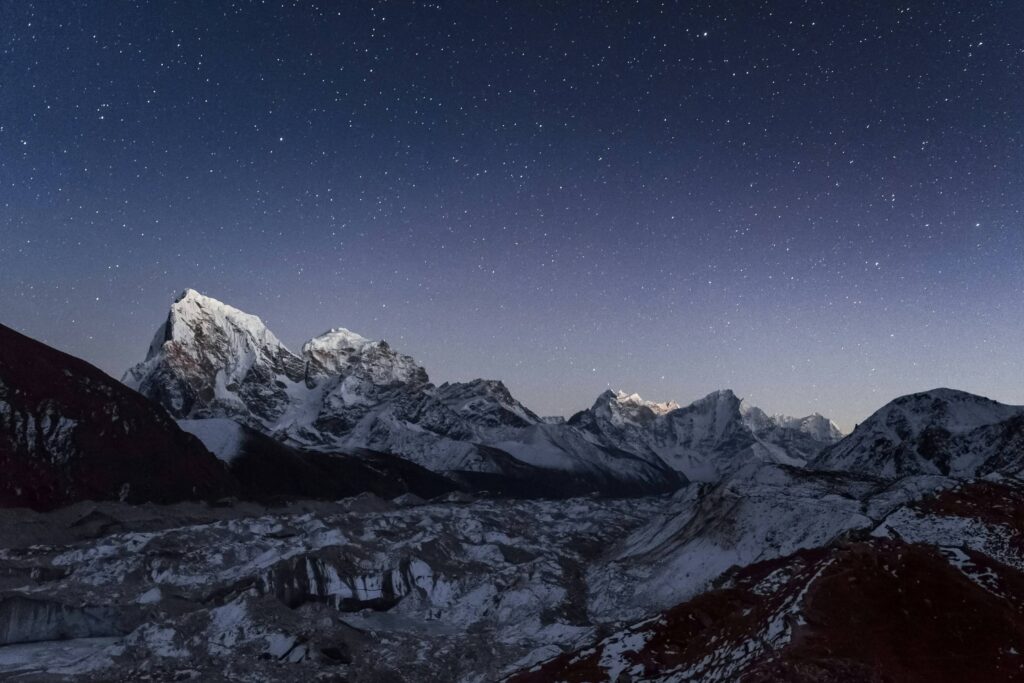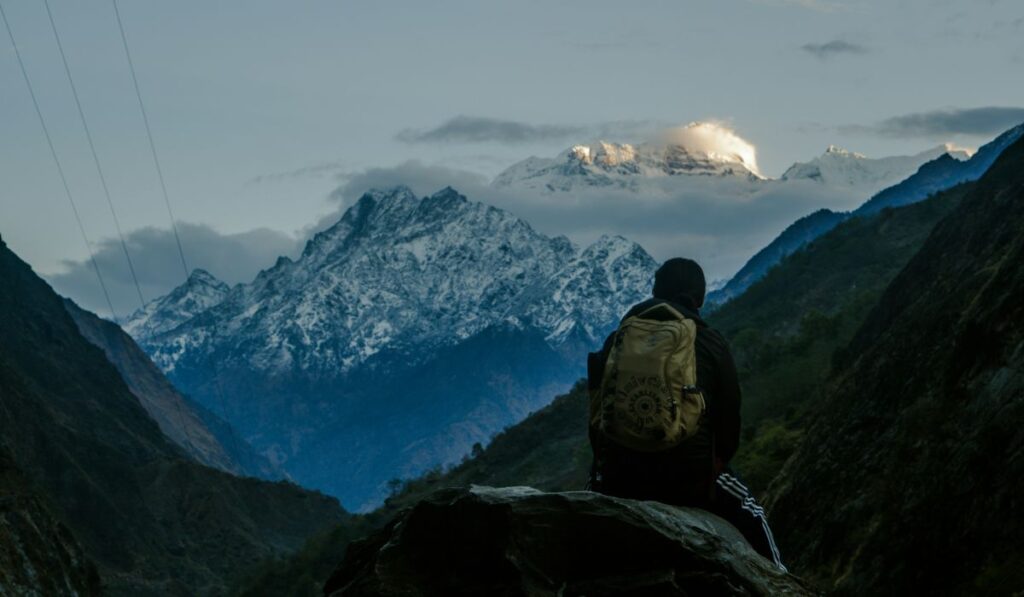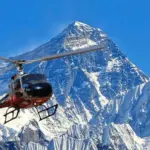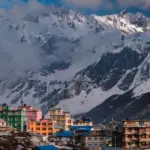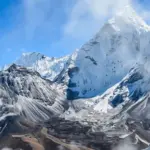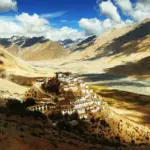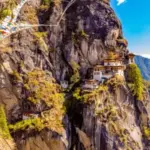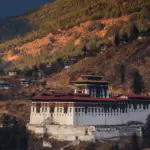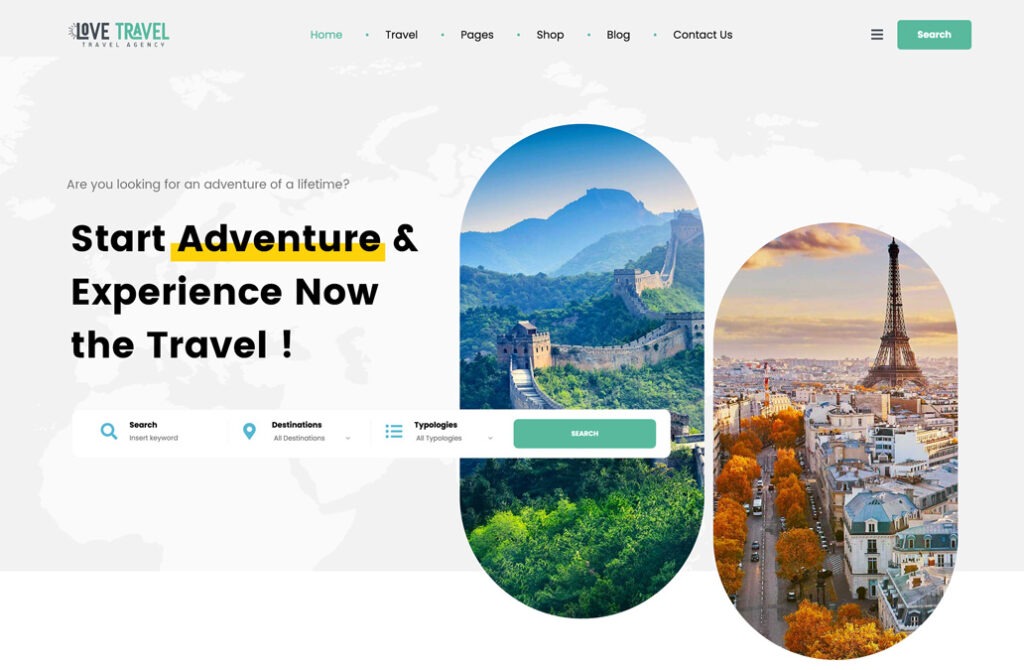Your legendary Everest Base Camp trek begins with a 30-minute scenic and nerve-ending flight to Lukla.
Your Everest Base Camp trek isn’t just about conquering heights but a holistic experience that immerses you in the unparalleled beauty of the Everest region. It blends awe-inspiring landscapes with rich Sherpa culture. Whether you gaze upon the majestic peaks of Pumori, Lhotse, and Nuptse or mingle with locals in Namche Bazaar, each footstep toward the EBC camp brings new perspectives on life.
We take pride in providing expert support and guide throughout your trek to EBC.
EBC Trek Facts
Country: Nepal
Duration: 12 Days
Activity: Trekking
Difficulty: Strenuous
Accommodation: Tea House & Hotel
Best Season: Mar-May, Sep Nov
Start/End Point: Kathmandu
Meals: Breakfast/Lunch/Dinner
Distance: 130km
Max. Altitude: 5,555m at Kalapatthar
Per Day Trekking: 4 – 6 hrs
Trek Highlights
- Sneak peek into the culture and lifestyle of the Sherpa community.
- Walk on the foothills of the world’s highest peak, Mount Everest (8,848m).
- Enjoy panoramic views of majestic peaks like Mt. Lhotse (8,516m), Mt. Cho Oyu (8,188m), and Mt. Makalu (8,485m).
- See endangered mammals like Musk Deer, Red Panda, Wild Yak, Hares, and Langur Monkeys in Sagarmatha National Park.
- Encounter traditional Buddhist symbols like prayer wheels and colorful flags along the trek.
- Explore ancient monasteries, including the revered Tengboche Monastery.
- Spot diverse wildlife such as musk deer, colorful pheasants, and elusive snow leopards.
- Witness the awe-inspiring Khumbu Glacier, the highest glacier on Earth.
- Reach maximum heights at Kala Patthar (5,555m) and soak in the breathtaking panoramic views.
- Visit Buddhist monasteries in Namche, Khumjung, Tengboche, and Panboche.
- Enjoy the warmth and hospitality of Sherpa-operated teahouses and lodges.
- Trek through remote and adventurous terrains in the Khumbu region.
- Discover rare and endangered flora and fauna native to the Everest region.
- Learn about the rich cultural history of the Khumbu region, including its Tibetan Buddhist heritage.
- Experience the thrill of trekking to the base of mighty Everest.
Trek Overview
With our close-knit connections with seasoned mountain guides, you can confidently trek the Himalayas. You should know that every detail has been meticulously planned for your comfort and safety. From the colorful rhododendron forests to the rugged terrain of Gorak shep, each leg of your epic EBC trek journey presents challenges and rewards.
Despite the physical exertion, a sense of shared purpose binds all trekkers as they create memories that last a lifetime.
In your Everest Base Camp trek, you’ll reach a maximum altitude of 5,555 meters at Kalapatthar. Our trek is tailored to accommodate adventures of all levels, with comfortable accommodations in tea houses and hotels along the route. Every moment promises to be an adventure worth cherishing. Whether you’re a seasoned trekker or a complete newbie, the Everest Base Camp trek promises ultimate Himalayan adventure and discovery.
Are you ready to experience a thrilling adventure surrounded by the mighty Himalayan peaks, including Mt. Everest?
EBC Trek Difficulty and Preparation
The EBC trek is not for the faint-hearted.
It’s for those who dare to conquer the rugged terrain and embrace the challenges it presents. With varying altitudes and the ever-looming possibility of altitude sickness, your EBC journey demands mental fortitude and personal endurance. The EBC trail winds through steep ascents and descents. You will walk through rocky paths and high-suspension bridges.
You must be prepared to face unpredictable weather conditions.
Before hopping onto the Everest base camp trek, we suggest you exercise regularly and jog in the weeks before the trip. This is essential for building the stamina required to tackle the challenging terrain of the Everest region.
Is 12-day Everest Base Camp Trekking Suitable for You?
Novice trekkers with average fitness levels can undertake this journey.
However, fitter people will undoubtedly find greater satisfaction in the Sherpa-like Himalayan experience. While prior hiking experience is beneficial, technical skills are optional for success on this trek. If you have the courage and want to include EBC Trek into your mountain accolade, you must be comfortable hiking for 4 to 6 hours a day at a steady pace with a light day pack.
However, trekkers with pre-existing medical conditions, such as heart or lung diseases, should consult with their physician before joining the Himalayan adventure.
Acclimatizing During EBC Trek
On your 12-day EBC trek, you’ll have only 2 acclimatization days to rest your tired legs.
- Day 3: Flight Hours: 40 Minutes
- Day 6: Rest day and acclimatization at Dingboche
While acclimatizing, you’ll have the chance to walk up the ridge and get 360-degree close-up views of the towering snow-capped peaks.
Accommodation for Everest Base Camp Trek
In our meticulously crafted trek package, you’ll enjoy an 11-night stay at handpicked accommodations.
Despite the high-altitude terrain, you can experience the comfort of well-appointed hotels and lodges thoughtfully selected for your utmost relaxation and rejuvenation.
Throughout your journey, you’ll have the luxury of private attached bathrooms during your five-night stays in Lukla, Phakding, and Namche (3 nights).
As a thoughtful touch, hot showers and Wi-Fi access are available at the lodges. However, you’ll only have basic amenities at higher altitudes.
Please note that while accommodations and meals in Kathmandu are not included, we recommend arranging for two days’ accommodation in Kathmandu—one before and another after your EBC trek.
Meals
Your high-altitude Everest adventure will be fueled with hearty and nutrient-rich meals to sustain your energy throughout the trek.
Altogether, you’ll have 12 lunches, 11 dinners, and 12 breakfasts that are included in our 12-day Everest base camp trek package.
You’ll get a chance to try out different Nepali cuisine. However, the possibility of getting Western cuisine might diminish as you go higher up in the altitude.
Here’s our recommendation for food.
While we encourage sampling traditional Nepali fare such as Dal (lentils), Bhat (rice), and Tarkari (curry)—staples beloved by locals—we meticulously select lodges and restaurants renowned for their fresh, hygienic, and nutritious offerings.
Your beverages will include green, lemon, and ginger tea, complemented by nourishing vegetable dishes and must-try garlic soup.
Stay hydrated and invigorated with a selection of revitalizing beverages including green tea, lemon tea, and ginger tea, complemented by nourishing vegetable dishes and must-try garlic soup.
Please be mindful that personal expenses, including alcoholic beverages and hot and cold drinks outside of standard meals, are not included in the package.
You have the flexibility to tailor your dining experience to your preferences.
Equipment You’ll Need for Everest Base Camp Trek
Face, Head & Hands:
- Sunscreen, Moisturizer
- Face/body wiper
- Lip balm
- Sunglasses with UV protection
- Sun hat
- Winter hat or insulating hat
- Light and heavy winter gloves
Apparels
- Hiking shirts
- Long sleeved shirt
- Hooded rain jacket
- Fleece jacket
- Lightweight cotton pants
- T-Shirt (bring Lightweight wool)
- Polypropylene underwear
- Down jacket (rent in Kathmandu)
- Sweater
- Waterproof jacket and pants
- Underwear
- Wind pants
- Thermal Shirts
- Hiking Boots
- Thick wool socks
Personal
- First aid kit
- Watch
- Camera
- Passport photocopies
- Binoculars
- Lighters
- Umbrella
Toiletries
- Towel
- Toothpaste and brush
- Nail clipper and Mirror
- Bio-degradable soap
- Shampoo
Essentials
- Trekking Pole
- Sleeping bag and liner
- Water purifier
- Thermal bottle
- Backpack
- Recharge
- Travel Adapter
Included
- Airport Transfer ( International/Domestic) four times.
- Round flight tickets (Kathmandu – Lukla – Kathmandu).
- Your cozy Himalayan lodging (Tea houses) experience throughout the trek
- Standard 3 meals during the trek (Breakfast, Lunch, and Dinner).
- Government-licensed guide with trekking experience.
- One porter for two trekkers.
- Luggage with weight limit (8kg). A porter will carry no more than 18kg.
- Guides and porters coverage: meals, insurance, salary, lodging, transportation, flight, and necessary equipment.
- Sagarmatha National Park entry permit fee
- Khumbu Pasang Lhamu Rural Municipality entry fees
- All government, local taxes, and official expenses
- Farewell dinner after you conclude your trek.
Excluded
- Tips for guides and porters.
- Accommodation and meals in Kathmandu before and after the journey.
- Your night in Kathmandu.
- Personal expenses such as shopping, snacks, water, hot and cold beverages, hot showers, Wi-Fi, telephone calls, battery recharge fees, extra porters, and other personal needs.
- Personal apparel.
- Travel insurance for urgent rescue and evacuation.
- Additional costs due to delays, such as landslides, weather conditions, itinerary modifications due to safety concerns, illness, changes in government policies, strikes, etc.
- Things which are not mentioned above in ‘What’s Included’.

